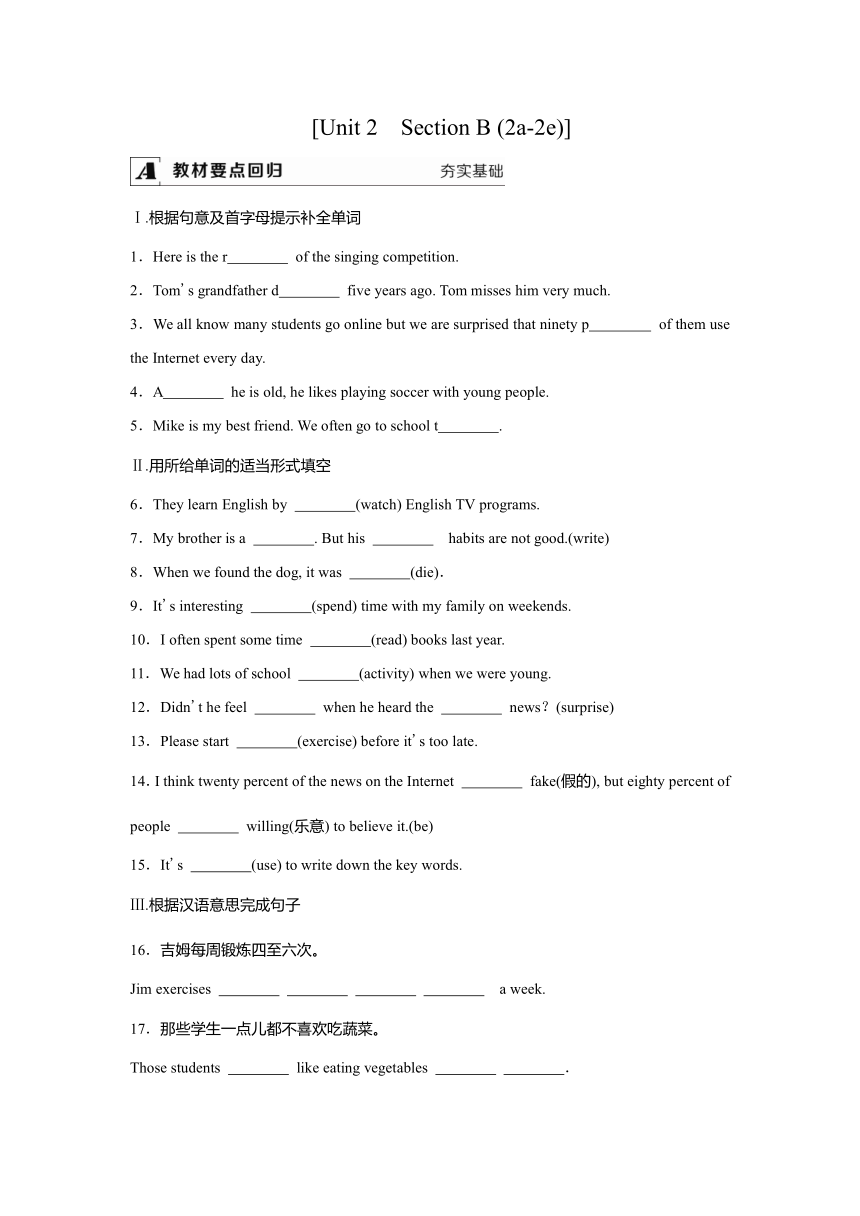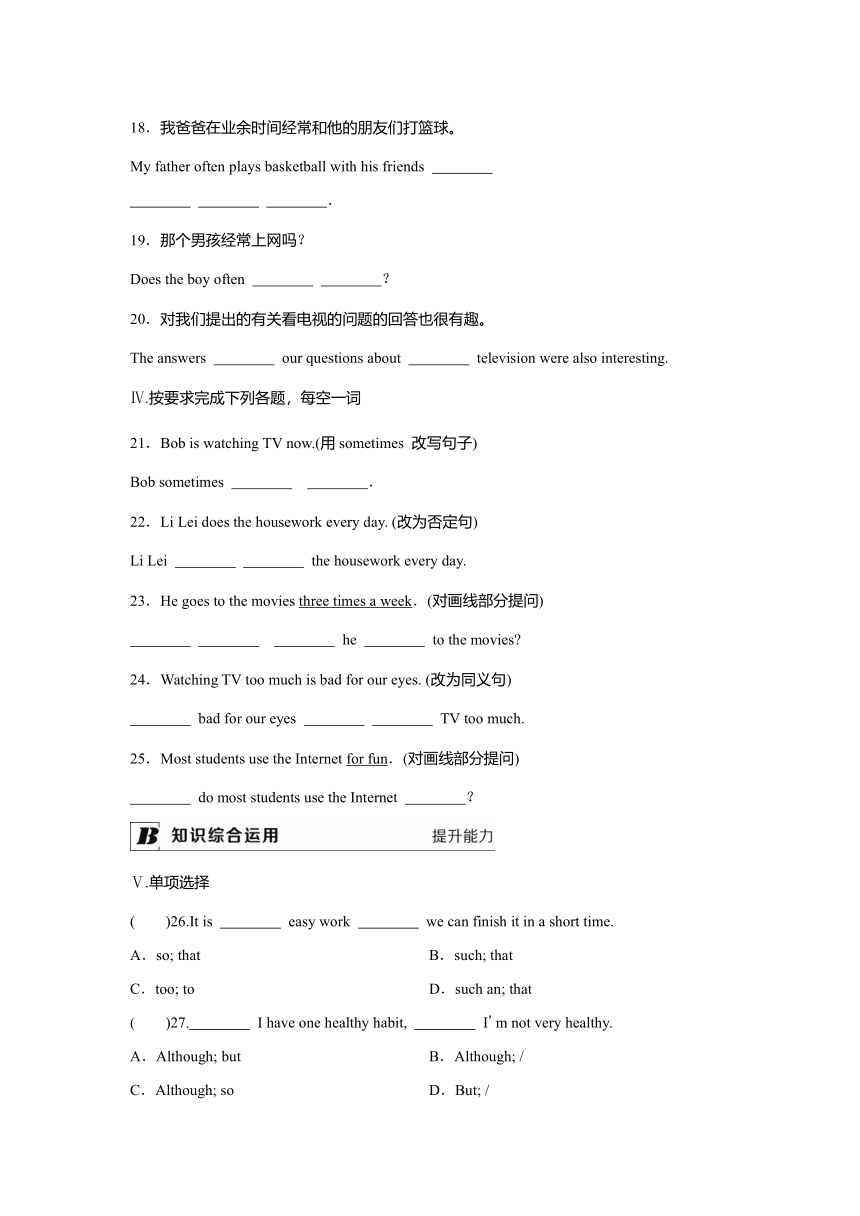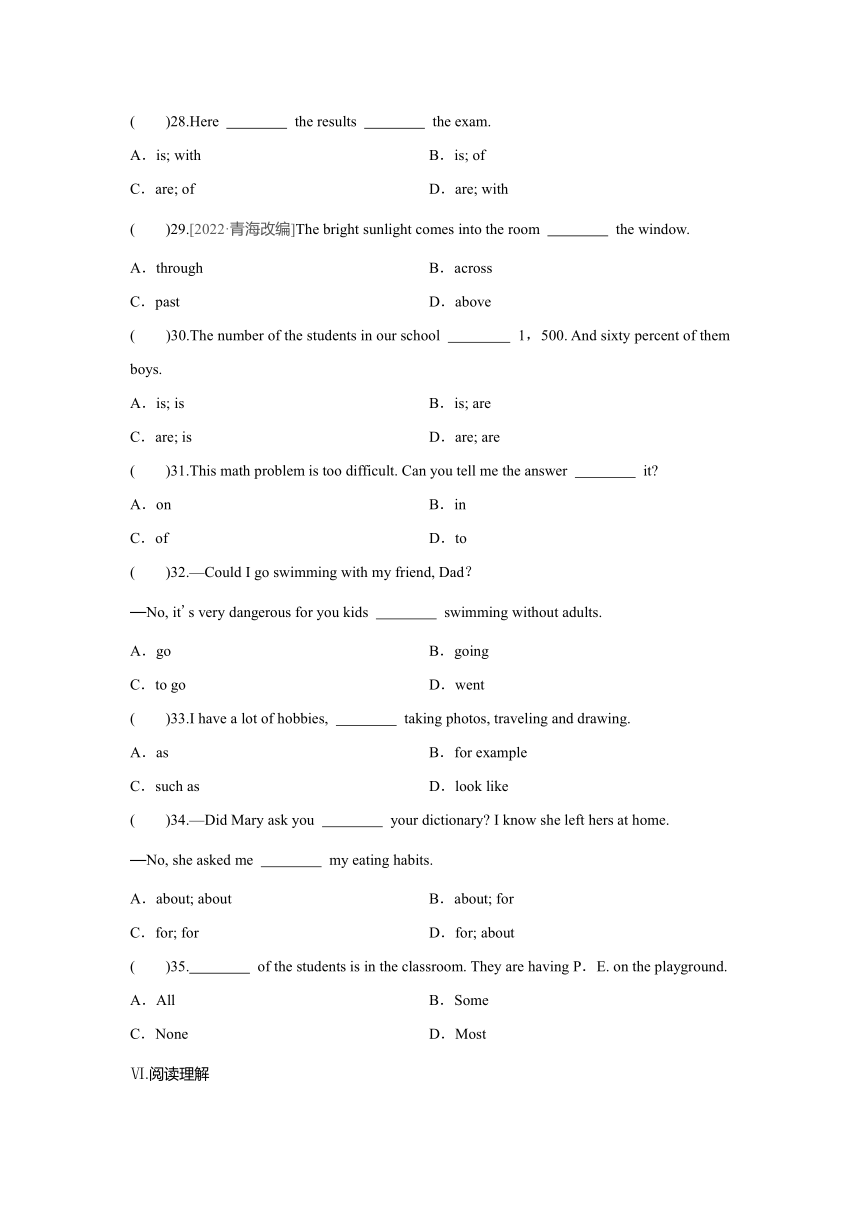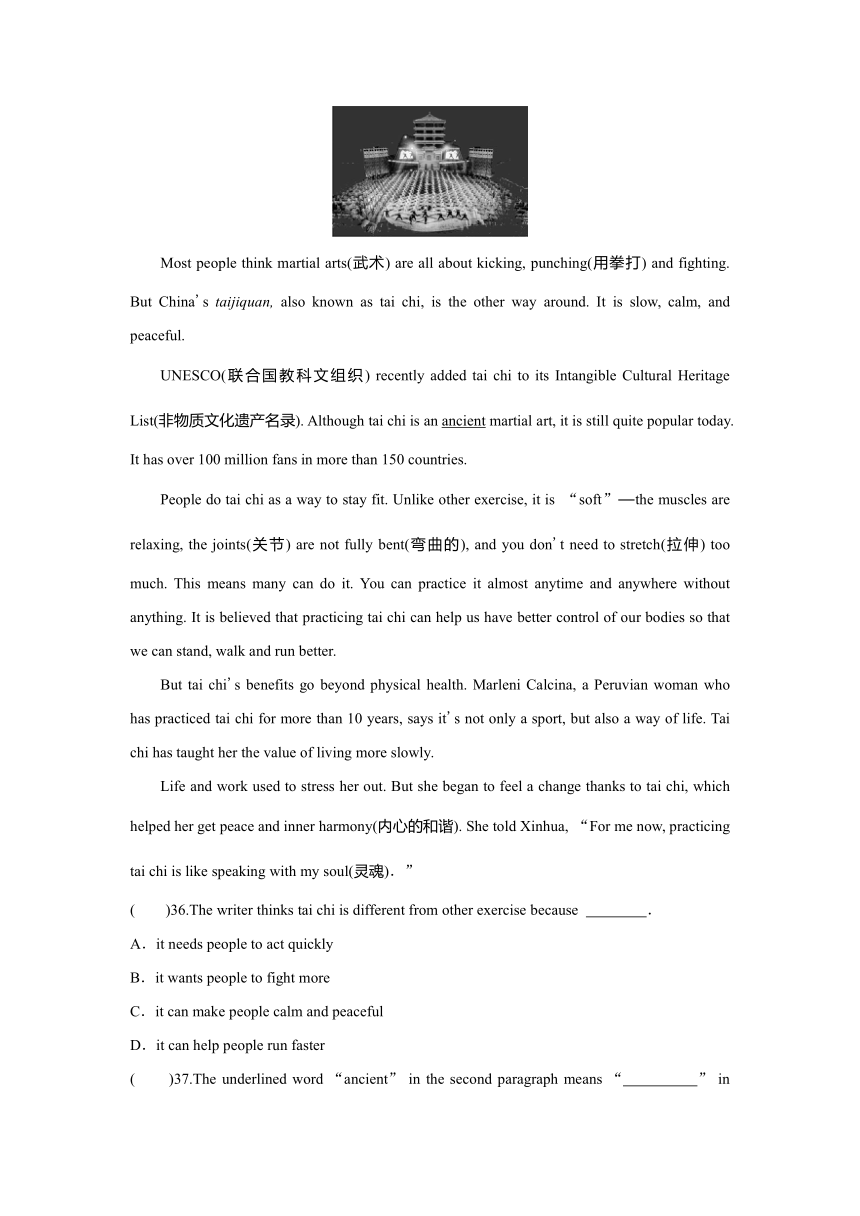人教版八年级上册 Unit 2 How often do you exercise?Section B (2a-2e) 同步训练(含答案)
文档属性
| 名称 | 人教版八年级上册 Unit 2 How often do you exercise?Section B (2a-2e) 同步训练(含答案) |  | |
| 格式 | doc | ||
| 文件大小 | 327.5KB | ||
| 资源类型 | 教案 | ||
| 版本资源 | 人教新目标(Go for it)版 | ||
| 科目 | 英语 | ||
| 更新时间 | 2022-10-19 13:41:56 | ||
图片预览




文档简介
[Unit 2 Section B (2a 2e)]
Ⅰ.根据句意及首字母提示补全单词
1.Here is the r of the singing competition.
2.Tom's grandfather d five years ago. Tom misses him very much.
3.We all know many students go online but we are surprised that ninety p of them use the Internet every day.
4.A he is old, he likes playing soccer with young people.
5.Mike is my best friend. We often go to school t .
Ⅱ.用所给单词的适当形式填空
6.They learn English by (watch) English TV programs.
7.My brother is a . But his habits are not good.(write)
8.When we found the dog, it was (die).
9.It's interesting (spend) time with my family on weekends.
10.I often spent some time (read) books last year.
11.We had lots of school (activity) when we were young.
12.Didn't he feel when he heard the news?(surprise)
13.Please start (exercise) before it's too late.
14.I think twenty percent of the news on the Internet fake(假的), but eighty percent of people willing(乐意) to believe it.(be)
15.It's (use) to write down the key words.
Ⅲ.根据汉语意思完成句子
16.吉姆每周锻炼四至六次。
Jim exercises a week.
17.那些学生一点儿都不喜欢吃蔬菜。
Those students like eating vegetables .
18.我爸爸在业余时间经常和他的朋友们打篮球。
My father often plays basketball with his friends
.
19.那个男孩经常上网吗?
Does the boy often ?
20.对我们提出的有关看电视的问题的回答也很有趣。
The answers our questions about television were also interesting.
Ⅳ.按要求完成下列各题,每空一词
21.Bob is watching TV now.(用sometimes 改写句子)
Bob sometimes .
22.Li Lei does the housework every day. (改为否定句)
Li Lei the housework every day.
23.He goes to the movies three times a week.(对画线部分提问)
he to the movies
24.Watching TV too much is bad for our eyes. (改为同义句)
bad for our eyes TV too much.
25.Most students use the Internet for fun.(对画线部分提问)
do most students use the Internet ?
Ⅴ.单项选择
( )26.It is easy work we can finish it in a short time.
A.so; that B.such; that
C.too; to D.such an; that
( )27. I have one healthy habit, I'm not very healthy.
A.Although; but B.Although; /
C.Although; so D.But; /
( )28.Here the results the exam.
A.is; with B.is; of
C.are; of D.are; with
( )29.[2022·青海改编]The bright sunlight comes into the room the window.
A.through B.across
C.past D.above
( )30.The number of the students in our school 1,500. And sixty percent of them boys.
A.is; is B.is; are
C.are; is D.are; are
( )31.This math problem is too difficult. Can you tell me the answer it
A.on B.in
C.of D.to
( )32.—Could I go swimming with my friend, Dad?
—No, it's very dangerous for you kids swimming without adults.
A.go B.going
C.to go D.went
( )33.I have a lot of hobbies, taking photos, traveling and drawing.
A.as B.for example
C.such as D.look like
( )34.—Did Mary ask you your dictionary I know she left hers at home.
—No, she asked me my eating habits.
A.about; about B.about; for
C.for; for D.for; about
( )35. of the students is in the classroom. They are having P.E. on the playground.
A.All B.Some
C.None D.Most
Ⅵ.阅读理解
Most people think martial arts(武术) are all about kicking, punching(用拳打) and fighting. But China's taijiquan, also known as tai chi, is the other way around. It is slow, calm, and peaceful.
UNESCO(联合国教科文组织) recently added tai chi to its Intangible Cultural Heritage List(非物质文化遗产名录). Although tai chi is an ancient martial art, it is still quite popular today. It has over 100 million fans in more than 150 countries.
People do tai chi as a way to stay fit. Unlike other exercise, it is “soft”—the muscles are relaxing, the joints(关节) are not fully bent(弯曲的), and you don't need to stretch(拉伸) too much. This means many can do it. You can practice it almost anytime and anywhere without anything. It is believed that practicing tai chi can help us have better control of our bodies so that we can stand, walk and run better.
But tai chi's benefits go beyond physical health. Marleni Calcina, a Peruvian woman who has practiced tai chi for more than 10 years, says it's not only a sport, but also a way of life. Tai chi has taught her the value of living more slowly.
Life and work used to stress her out. But she began to feel a change thanks to tai chi, which helped her get peace and inner harmony(内心的和谐). She told Xinhua, “For me now, practicing tai chi is like speaking with my soul(灵魂).”
( )36.The writer thinks tai chi is different from other exercise because .
A.it needs people to act quickly
B.it wants people to fight more
C.it can make people calm and peaceful
D.it can help people run faster
( )37.The underlined word “ancient” in the second paragraph means “ ” in Chinese.
A.古老的 B.现代的
C.陈旧的 D.固定的
( )38.From the third paragraph we can know that .
A.tai chi has a long history
B.tai chi is popular in the world
C.practicing tai chi needs much money
D.practicing tai chi is very useful
( )39.The writer mentions(提及) the Peruvian woman to tell us .
A.women can practice tai chi
B.people can get more from tai chi
C.only old people can practice tai chi
D.practicing tai chi needs a long time
( )40.What's the passage mainly about
A.The benefits of tai chi.
B.Who can play tai chi.
C.When to play tai chi.
D.How to play tai chi.
Ⅶ.词语运用
阅读下面短文,在空白处填入一个适当的单词或括号内单词的正确形式。
Hello! I'm John. I'm in a health club now. I'm interviewing(采访) three students. Here are the 41. (result).
My name is David. I 42. (hard) did any exercise in the past. So, I felt tired. Then I come here to exercise myself. Good health makes my body and mind great and helps me study well. I come here 43. (two) a week. I exercise for thirty minutes each time.
I'm Alice. I was fat half a year ago. I liked 44. (eat) junk food with a cup of coffee. Because 45. my large body, no one wanted to make friends 46. me. So I come here 47. (lose) weight(减肥). I have many good friends in the club now. We often exercise together. Look! I'm so healthy now.
I'm Ann. I have lots of homework to do every day. I think exercise can make me 48. (relax) and help me study well.49. I am very busy every day, I spend at 50. (little) forty minutes here.
答案
Ⅰ.1.result 2.died 3.percent
4.Although 5.together
Ⅱ.6.watching 7.writer; writing 8.dead
9.to spend 10.reading
11.activities 12.surprised; surprising
13.exercising/to exercise
14.is; are 15.useful
Ⅲ.16.four to six times
17.don't; at all
18.in his spare/free time
19.go online 20.to; watching
Ⅳ.21.watches TV 22.doesn't do
23.How often does; go
24.It's; to watch
25.What; for
Ⅴ.26.B 27.B 28.C 29.A 30.B 31.D
32.C 固定句型。“It's+adj.+for sb. to do sth.”意为“做某事对某人来说……”,
33.C for example 和such as都用来列举事物,但for example一般只列举同类事物或人中的一个,作插入语时,用逗号隔开;such as用来列举同类人或事物中的几个。as意为“如同”;look like意为“看起来像”。
34.D ask sb. for sth.意为“向某人要某物”;ask sb. about sth.意为“询问某人关于某事”。句意: “Mary向你要字典了吗?我知道她把她的字典落家里了。”“没有,她询问了我的饮食习惯。”
35.C 代词的辨析。all意为“三者及三者以上都”;some意为“一些”;none意为“没有(可指人或物)”;most意为“大多数”。句意:教室里一个学生也没有。他们正在操场上上体育课。
Ⅵ.【主旨大意】 本文讲述了一种很受欢迎的运动——太极拳。联合国教科文组织最近将太极拳列入非物质文化遗产名录。练习太极拳可以给人们带来很多益处,能修身养性。
36.C 推理判断题。由第一段中的“It is slow, calm, and peaceful.”可推断,练习太极拳可让人们平静和安宁。
37.A 词义猜测题。由短文第二段中的“it is still quite popular today”可知是古代与现在对比,由此推知,ancient意为“古老的”。
38.D 推理判断题。由第三段最后一句“It is believed that practicing tai chi can help us have better control of our bodies so that we can stand, walk and run better.”可推断,练习太极拳可以给人们带来很多好处。
39.B 推理判断题。由第四段中的“…it's not only a sport, but also a way of life…”可知,Marleni Calcina认为太极拳不仅是一项运动,也是一种生活方式,太极拳让她懂得了慢生活的价值。由此可推断,人们从练习太极拳中可收获很多。
40.A 主旨大意题。通读全文内容可知,本文主要讲述了太极拳对人们的好处。
Ⅶ.41.results 42.hardly 43.twice
44.to eat/eating 45.of 46.with
47.to lose 48.relaxed
49.Although/Though 50.least
Ⅰ.根据句意及首字母提示补全单词
1.Here is the r of the singing competition.
2.Tom's grandfather d five years ago. Tom misses him very much.
3.We all know many students go online but we are surprised that ninety p of them use the Internet every day.
4.A he is old, he likes playing soccer with young people.
5.Mike is my best friend. We often go to school t .
Ⅱ.用所给单词的适当形式填空
6.They learn English by (watch) English TV programs.
7.My brother is a . But his habits are not good.(write)
8.When we found the dog, it was (die).
9.It's interesting (spend) time with my family on weekends.
10.I often spent some time (read) books last year.
11.We had lots of school (activity) when we were young.
12.Didn't he feel when he heard the news?(surprise)
13.Please start (exercise) before it's too late.
14.I think twenty percent of the news on the Internet fake(假的), but eighty percent of people willing(乐意) to believe it.(be)
15.It's (use) to write down the key words.
Ⅲ.根据汉语意思完成句子
16.吉姆每周锻炼四至六次。
Jim exercises a week.
17.那些学生一点儿都不喜欢吃蔬菜。
Those students like eating vegetables .
18.我爸爸在业余时间经常和他的朋友们打篮球。
My father often plays basketball with his friends
.
19.那个男孩经常上网吗?
Does the boy often ?
20.对我们提出的有关看电视的问题的回答也很有趣。
The answers our questions about television were also interesting.
Ⅳ.按要求完成下列各题,每空一词
21.Bob is watching TV now.(用sometimes 改写句子)
Bob sometimes .
22.Li Lei does the housework every day. (改为否定句)
Li Lei the housework every day.
23.He goes to the movies three times a week.(对画线部分提问)
he to the movies
24.Watching TV too much is bad for our eyes. (改为同义句)
bad for our eyes TV too much.
25.Most students use the Internet for fun.(对画线部分提问)
do most students use the Internet ?
Ⅴ.单项选择
( )26.It is easy work we can finish it in a short time.
A.so; that B.such; that
C.too; to D.such an; that
( )27. I have one healthy habit, I'm not very healthy.
A.Although; but B.Although; /
C.Although; so D.But; /
( )28.Here the results the exam.
A.is; with B.is; of
C.are; of D.are; with
( )29.[2022·青海改编]The bright sunlight comes into the room the window.
A.through B.across
C.past D.above
( )30.The number of the students in our school 1,500. And sixty percent of them boys.
A.is; is B.is; are
C.are; is D.are; are
( )31.This math problem is too difficult. Can you tell me the answer it
A.on B.in
C.of D.to
( )32.—Could I go swimming with my friend, Dad?
—No, it's very dangerous for you kids swimming without adults.
A.go B.going
C.to go D.went
( )33.I have a lot of hobbies, taking photos, traveling and drawing.
A.as B.for example
C.such as D.look like
( )34.—Did Mary ask you your dictionary I know she left hers at home.
—No, she asked me my eating habits.
A.about; about B.about; for
C.for; for D.for; about
( )35. of the students is in the classroom. They are having P.E. on the playground.
A.All B.Some
C.None D.Most
Ⅵ.阅读理解
Most people think martial arts(武术) are all about kicking, punching(用拳打) and fighting. But China's taijiquan, also known as tai chi, is the other way around. It is slow, calm, and peaceful.
UNESCO(联合国教科文组织) recently added tai chi to its Intangible Cultural Heritage List(非物质文化遗产名录). Although tai chi is an ancient martial art, it is still quite popular today. It has over 100 million fans in more than 150 countries.
People do tai chi as a way to stay fit. Unlike other exercise, it is “soft”—the muscles are relaxing, the joints(关节) are not fully bent(弯曲的), and you don't need to stretch(拉伸) too much. This means many can do it. You can practice it almost anytime and anywhere without anything. It is believed that practicing tai chi can help us have better control of our bodies so that we can stand, walk and run better.
But tai chi's benefits go beyond physical health. Marleni Calcina, a Peruvian woman who has practiced tai chi for more than 10 years, says it's not only a sport, but also a way of life. Tai chi has taught her the value of living more slowly.
Life and work used to stress her out. But she began to feel a change thanks to tai chi, which helped her get peace and inner harmony(内心的和谐). She told Xinhua, “For me now, practicing tai chi is like speaking with my soul(灵魂).”
( )36.The writer thinks tai chi is different from other exercise because .
A.it needs people to act quickly
B.it wants people to fight more
C.it can make people calm and peaceful
D.it can help people run faster
( )37.The underlined word “ancient” in the second paragraph means “ ” in Chinese.
A.古老的 B.现代的
C.陈旧的 D.固定的
( )38.From the third paragraph we can know that .
A.tai chi has a long history
B.tai chi is popular in the world
C.practicing tai chi needs much money
D.practicing tai chi is very useful
( )39.The writer mentions(提及) the Peruvian woman to tell us .
A.women can practice tai chi
B.people can get more from tai chi
C.only old people can practice tai chi
D.practicing tai chi needs a long time
( )40.What's the passage mainly about
A.The benefits of tai chi.
B.Who can play tai chi.
C.When to play tai chi.
D.How to play tai chi.
Ⅶ.词语运用
阅读下面短文,在空白处填入一个适当的单词或括号内单词的正确形式。
Hello! I'm John. I'm in a health club now. I'm interviewing(采访) three students. Here are the 41. (result).
My name is David. I 42. (hard) did any exercise in the past. So, I felt tired. Then I come here to exercise myself. Good health makes my body and mind great and helps me study well. I come here 43. (two) a week. I exercise for thirty minutes each time.
I'm Alice. I was fat half a year ago. I liked 44. (eat) junk food with a cup of coffee. Because 45. my large body, no one wanted to make friends 46. me. So I come here 47. (lose) weight(减肥). I have many good friends in the club now. We often exercise together. Look! I'm so healthy now.
I'm Ann. I have lots of homework to do every day. I think exercise can make me 48. (relax) and help me study well.49. I am very busy every day, I spend at 50. (little) forty minutes here.
答案
Ⅰ.1.result 2.died 3.percent
4.Although 5.together
Ⅱ.6.watching 7.writer; writing 8.dead
9.to spend 10.reading
11.activities 12.surprised; surprising
13.exercising/to exercise
14.is; are 15.useful
Ⅲ.16.four to six times
17.don't; at all
18.in his spare/free time
19.go online 20.to; watching
Ⅳ.21.watches TV 22.doesn't do
23.How often does; go
24.It's; to watch
25.What; for
Ⅴ.26.B 27.B 28.C 29.A 30.B 31.D
32.C 固定句型。“It's+adj.+for sb. to do sth.”意为“做某事对某人来说……”,
33.C for example 和such as都用来列举事物,但for example一般只列举同类事物或人中的一个,作插入语时,用逗号隔开;such as用来列举同类人或事物中的几个。as意为“如同”;look like意为“看起来像”。
34.D ask sb. for sth.意为“向某人要某物”;ask sb. about sth.意为“询问某人关于某事”。句意: “Mary向你要字典了吗?我知道她把她的字典落家里了。”“没有,她询问了我的饮食习惯。”
35.C 代词的辨析。all意为“三者及三者以上都”;some意为“一些”;none意为“没有(可指人或物)”;most意为“大多数”。句意:教室里一个学生也没有。他们正在操场上上体育课。
Ⅵ.【主旨大意】 本文讲述了一种很受欢迎的运动——太极拳。联合国教科文组织最近将太极拳列入非物质文化遗产名录。练习太极拳可以给人们带来很多益处,能修身养性。
36.C 推理判断题。由第一段中的“It is slow, calm, and peaceful.”可推断,练习太极拳可让人们平静和安宁。
37.A 词义猜测题。由短文第二段中的“it is still quite popular today”可知是古代与现在对比,由此推知,ancient意为“古老的”。
38.D 推理判断题。由第三段最后一句“It is believed that practicing tai chi can help us have better control of our bodies so that we can stand, walk and run better.”可推断,练习太极拳可以给人们带来很多好处。
39.B 推理判断题。由第四段中的“…it's not only a sport, but also a way of life…”可知,Marleni Calcina认为太极拳不仅是一项运动,也是一种生活方式,太极拳让她懂得了慢生活的价值。由此可推断,人们从练习太极拳中可收获很多。
40.A 主旨大意题。通读全文内容可知,本文主要讲述了太极拳对人们的好处。
Ⅶ.41.results 42.hardly 43.twice
44.to eat/eating 45.of 46.with
47.to lose 48.relaxed
49.Although/Though 50.least
同课章节目录
- Unit 1 Where did you go on vacation?
- Section A
- Section B
- Unit 2 How often do you exercise?
- Section A
- Section B
- Unit 3 I'm more outgoing than my sister.
- Section A
- Section B
- Unit 4 What's the best movie theater?
- Section A
- Section B
- Unit 5 Do you want to watch a game show?
- Section A
- Section B
- Unit 6 I'm going to study computer science.
- Section A
- Section B
- Unit 7 Will people have robots?
- Section A
- Section B
- Unit 8 How do you make a banana milk shake?
- Section A
- Section B
- Unit 9 Can you come to my party?
- Section A
- Section B
- Unit 10 If you go to the party, you'll have a grea
- Section A
- Section B
